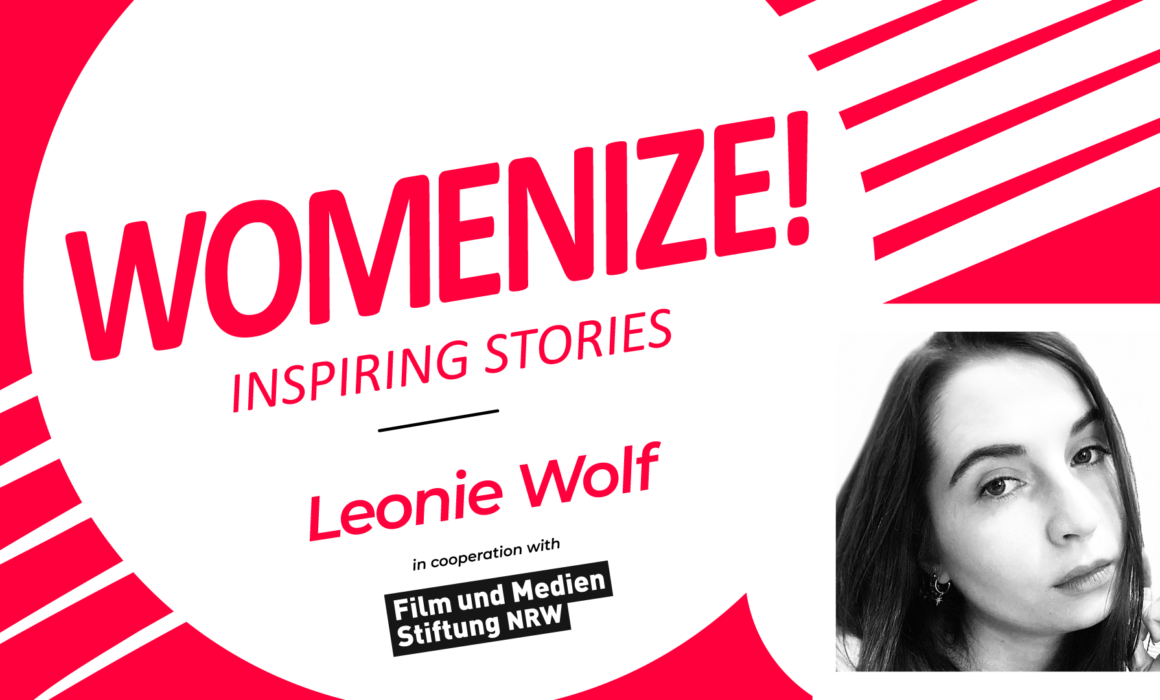Leonie Wolf – Womenize! – Inspiring Stories
Womenize! – Inspiring Stories is our weekly series featuring inspirational women from games and tech. For this edition in cooperation with the Film und Medien Stiftung NRW, we talked to Leonie Wolf, 3D Artist at Giant Door UG and Member of the #FemDevsMeetup Organization Team. Leonie speaks about co-founding her own company, as well as her work and research in games and mental health. Read more about Leonie in this interview:
Hi Leonie! You’ve co-founded your own company a few years back, what were the biggest challenges in getting started?
Hi! Thank you for the invitation. I think the biggest challenge was navigating through the bureaucracy jungle to get the company officially registered and especially doing all this without any initial funding or financial capital. I also found it quite hard to do this without proper legal advice, so we used every free or low-cost opportunity to get information that we could find.
Aside from that, we had to assess our resources and plan a project that we could complete within the little time that we had (only six months) between the three of us. We looked at our skills and decided what every team member could contribute. Then we thought about what kind of game each of us wanted to develop and which aspects were important for us. This way, we narrowed down the scope and designed a project that we could achieve. And we did!
Mostly, our company was founded to get to know the process for “the real deal” after graduating. I think it helped us a lot and we can apply the knowledge in the company that I am currently working at, Giant Door. One of the co-founders of Giant Door, Jonas, also co-founded my first company with me back then, and it’s easy to work with and trust someone who you already know.
What do you enjoy most in your current role as 3D Game Artist?
I think my love for 3D art is two sided – on one side I really like the technical aspect of it. I remember when I had my first encounters in university with the 3D pipeline for games and how lost I felt. It seemed so complicated and unintuitive, and I remember thinking “I’m never going to be able to do this”. But like all things, it just takes practice and, in the best case, someone who can push you in the right direction here and there. Now I find myself loving a lot of the steps in the 3D pipeline which I used to dread, and I enjoy learning more things about it every day.
On the other side I like how I can just make anything that I can dream of. With enough time and resources, I can build a whole game world and fill it with things and characters from my imagination and I would learn a whole bunch of new things along the way. And the best part is that people can interact with it! They can go into every nook and cranny of the game world and look at all the details, interact with objects and give meaning to what I created. The best compliment for me is, when people notice the little details that I try to put in my work and when they can resonate with the emotions that I wanted to induce in them.
In your opinion, how can games function as mental health therapy tools?
Speaking of emotions, games are incredibly powerful tools to move players emotionally. They can suck you in, make you laugh, create anger, enravish you, make you feel sorrow, give you a feeling of accomplishment, etc. The key factor here is immersion. Because games are interactive, players have a different sense of control compared to other media and players can experience the game content on a much larger emotional scale.
In the research for my bachelor’s thesis, in which I wrote how games can be used as a therapy tool for depression, I found that digital games are very accessible to most people, and they hold great potential to have a cognitive impact on different mental health issues. They are a very adaptable form of media that can be incorporated in various therapeutic settings. The history of phobia treatment with virtual reality goes all the way back to the 90s for example. As a form of art, digital games also profit from the huge body of evidence from practices like art therapy. The findings from my research would go beyond the scope of this interview but I have published my thesis, if anyone is interested in more details. Currently I am extending my knowledge in this area in writing my master’s thesis about “Visual Healing”.
Thank you for your time, Leonie!
Leonie’s links: LinkedIn │ Twitter │ #FemDevsMeetup website │ Derpy Conga on Steam
Womenize! – Inspiring Stories Feature by Sophie Brügmann

